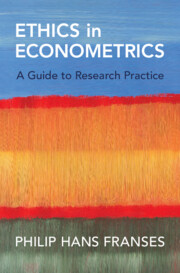Book contents
- Ethics in Econometrics
- Ethics in Econometrics
- Copyright page
- Contents
- Figures
- Tables
- Preface
- Acknowledgments
- Recommended Reading
- Introduction
- 1 Ethical Guidelines
- 2 Scientific Misconduct
- 3 Influential Observations
- 4 Model Selection
- 5 Estimation and Interpretation
- 6 Missing Data
- 7 Spurious Relations
- 8 Blinded by the Data
- 9 Predictability
- 10 Adjustment of Forecasts
- 11 Big Data
- 12 Algorithms
- Conclusion
- Index
- References
1 - Ethical Guidelines
Published online by Cambridge University Press: 14 November 2024
- Ethics in Econometrics
- Ethics in Econometrics
- Copyright page
- Contents
- Figures
- Tables
- Preface
- Acknowledgments
- Recommended Reading
- Introduction
- 1 Ethical Guidelines
- 2 Scientific Misconduct
- 3 Influential Observations
- 4 Model Selection
- 5 Estimation and Interpretation
- 6 Missing Data
- 7 Spurious Relations
- 8 Blinded by the Data
- 9 Predictability
- 10 Adjustment of Forecasts
- 11 Big Data
- 12 Algorithms
- Conclusion
- Index
- References
Summary
The first chapter contains an overview of what is accepted as good practice. We review several general ethical guidelines. These can be used to appreciate good research and to indicate where and how research does not adhere to them. Good practice is “what we all say we (should) adhere to.” In the second part of this chapter, the focus is more on specific ethical guidelines for statistical analysis. Of course, there is overlap with the more general guidelines, but there are also a few specifically relevant to statistics: Examples are misinterpreting p values and malpractice such as p hacking and harking.
Keywords
Information
- Type
- Chapter
- Information
- Ethics in EconometricsA Guide to Research Practice, pp. 11 - 33Publisher: Cambridge University PressPrint publication year: 2024
References
Further Reading
A highly informative and well-written book on how numbers and graphs can fool us.
To gain some impression of parts of the forthcoming chapters.
A key publication addressing the shortcomings of much research in social psychology.
On Replications
An early attempt to replicate results, with difficult to obtain original data and computer programs.
